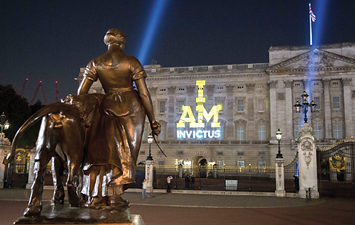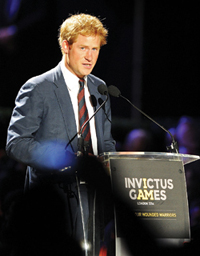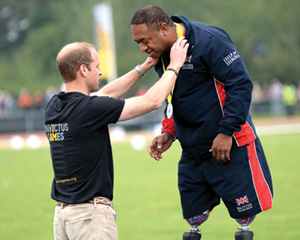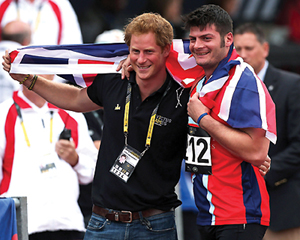|
INVICTUS SPIRIT
by Captain H C A D Wales
The Blues and Royals
|

Buckingham Palace illuminated for The Invictus Games © Invictus Games
|
In September last year the first ever Invictus Games was held in some of the iconic venues of The Queen Elizabeth Olympic Park, here in our nation's capital. In less than ten months, the seed of an idea became an International multi-sport event watched by thousands across the country and the world. The Games became far bigger and better than anyone could have hoped with more than 400 wounded, injured and sick servicemen and women from 13 Nations, battling it out on the track, on the court or in the pool, over four days. The stage was set for a truly awesome competition. Even the weather was kind, with a perfectly timed 'Indian summer’ making for a week which would never be forgotten.
Wounded, injured and sick servicemen and women from all cap badges, backgrounds and generations wanted to take part. Pressure for places on the UK team became fiercely competitive, with people applying from all stages of the recovery pathway; 130 competitors were selected for the UK team from over 350 hopefuls. However, this competition was never meant to be an exclusive opportunity but rather a chance for everyone to bring a chapter in their recovery to a close. Having said that, by the time of the games, confidence amongst the UK team was high and they wanted to win!
 Prince Harry speaks at the opening ceremony
of the Invictus Games
Prince Harry speaks at the opening ceremony
of the Invictus Games
© Invictus Games |
The pressure to deliver became huge; not only were they representing their country again but doing so in a very poignant year, in front of their friends, families and the wider British public, not to mention the Major General and Garrison Sergeant Major. The vital part played by friends and families in the recovery process was something which we felt was important for the games to highlight; indeed many of those competing said that they simply wouldn’t have been there without the continued love and support from those closest to them. Therefore we encouraged as many of them to come and support as possible, not that they needed much encouraging!
From the beginning, there were many hopes and aspirations, both from the organisers and those taking part. However, there was one thing which we couldn’t control or guarantee. Not the winning - that was in the bag - but how the competitors would react when faced with such amazing venues, in front of large audiences and live television. Well, true to form, every single one of them was a superb ambassador for their regiment, service and the country. It was as though they’d been doing it for years, chatting to Chelsea Pensioners, posing for selfies with kids, answering pretty personal questions while being interviewed by Jonathan Edwards. It appeared to all be in a day's work, especially for the UK Team Captain, Dave Henson, who missed most of the Opening Ceremony and his heats due to interviews. When I shared my concerns with him and offered him a way out, he simply said ‘no worries, the British public need to hear it, it’s important’.
Let’s remember, this was an event, a name, a brand that had never been heard of before and hadn't even existed six months earlier. No one knew whether it would be any good or how it would make them feel. Still, such is the admiration and respect for the Armed Forces in this country that the British public turned out in their thousands. Each day the momentum grew, word spread and the supporters flocked. On Friday night in the Copper Box Arena, a member of the public said to me ‘you couldn’t have done this in any other country. Only the Great British public would react like this’. He wasn't wrong, the support was truly fantastic. Later that night, the UK wheelchair rugby team beat the US by scoring a winning goal in the last moments of the game. We couldn’t have scripted it more perfectly. So much so, I think people thought we had set it up!
To stand on the side-lines and watch our servicemen and women competing in events that previously they never thought possible was a true privilege, particularly for all those of us involved in the games. Their strength and determination was remarkable. The generals, foreign diplomats, politicians, organisers, and general public were glued to their seats. In my mind, everyone had come to say thank you. Thank you to all those who had given so much and to those who had paid the ultimate sacrifice. There was a strange irony in this, as many of the competitors wanted to take part in the Games to say thank you to the British public for their continued support, channelled through the service charities, and to those who had supported them directly on their road to recovery. It made for a very special atmosphere - one which I don’t think I will ever feel again. One which even those who had worked on the Olympics had never seen before. All credit for this must go to the competitors of the 13 nations, and of course especially our boys and girls.
By Sunday evening, the sport was over, the medals were won. But what would become clear after the excitement had calmed was how many lives had been changed for the better. This is not a term to be used lightly, I know, but the people we met, families from the services and otherwise, were overcome with emotion. People sitting on their sofas back home suddenly believed that anything was possible - we have the letters to prove it. Those competitors had not only proven something to themselves, but in doing so, had changed people’s perceptions of overcoming adversity, moving beyond injury and seeing a purpose in life. Over the week of the Games, we watched sport play a huge part in recovery and rehabilitation of the competitors and many of those watching. It was smiles and laughter as well as accomplishment and respect.
The Games ended with our team of 130 servicemen and women on stage in front of 27,000 people, and millions at home. Forget the Foo Fighters, the biggest cheer was for them, and they deserved it.
Thank you to everyone that helped make it happen, whether you were a competitor, family member, volunteer, spectator or organiser. It was seriously good fun and I look forward to another amazing UK team performance at the next one.

The Duke of Cambridge presents Derek Derenalagi
with his silver medal (he also won two gold medals) © MOD |
 Prince Harry and UK Team Captain, Dave Henson Prince Harry and UK Team Captain, Dave Henson
© Invictus Games |
|
|




